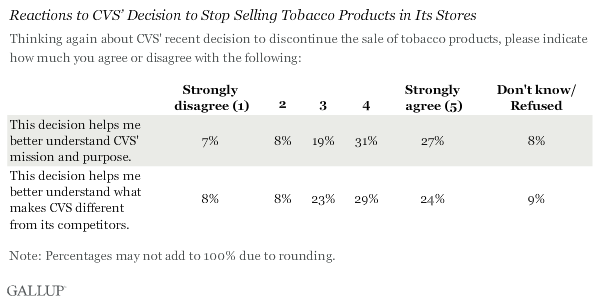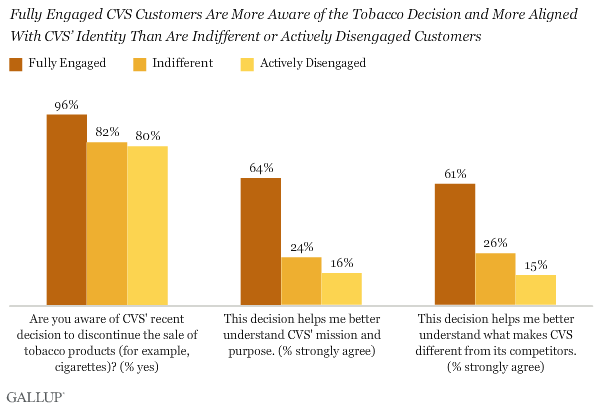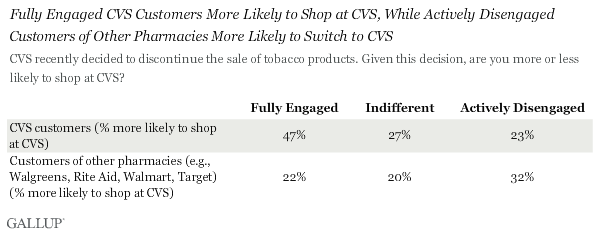Is CVS' decision bold and courageous? Or foolhardy? Maybe it's just plain smart.
CVS Caremark estimates that its recent decision to discontinue the sale of tobacco products at its U.S. retail locations could cost the company $2 billion in revenues annually. But CVS President and CEO Larry J. Merlo is undaunted. "Ending the sale of cigarettes and tobacco products at CVS/pharmacy is the right thing for us to do for our customers and our company to help people on their path to better health," he said, explaining the decision, which will take effect by October 1, 2014. "Put simply, the sale of tobacco products is inconsistent with our purpose."
Is this decision bold and courageous? Or foolhardy? Maybe it's just plain smart and forward-thinking. It's quite possible that the decision to discontinue the sale of tobacco-related products could strengthen the company's identity, making consumers more likely to shop at CVS -- which ultimately could lead to increased sales.
���۴�ýresearch conducted following the announcement found that awareness of CVS' decision to discontinue the sale of tobacco products was widespread. More than eight in 10 respondents (81%) -- including CVS shoppers and non-CVS shoppers -- reported that they were aware of the company's proposed action. More than half of the respondents either agreed or strongly agreed that the decision helped them better understand CVS' mission and purpose (58%) and that the announcement helped them better understand what makes CVS different from its competitors (53%).

Companies with strong identities communicate a clear purpose, provide a brand promise that differentiates them from competitors, and create a culture that supports the delivery of that purpose and brand promise. By clarifying its purpose for consumers and differentiating itself from its competitors, CVS has a unique opportunity to potentially increase sales. The majority of consumers report that the decision to discontinue tobacco sales will have minimal impact on their shopping behavior. But shoppers who report that they are more likely to shop at CVS far outnumber those who are less likely to shop there.

How CVS' decision will affect customers and their engagement
���۴�ýclassifies customers as fully engaged (love the brand), indifferent (don't care about the brand), and actively disengaged (hate the brand). Among CVS customers, those who are fully engaged are more aware of the tobacco decision (96%) than are indifferent (82%) or actively disengaged customers (80%). More fully engaged customers strongly agree that the decision helps them better understand CVS' mission and purpose (64%) compared with indifferent (24%) and actively disengaged customers (16%). Similarly, more fully engaged customers strongly agree that the decision helps them better understand what makes CVS different from its competitors (61%) compared with indifferent (26%) and actively disengaged customers (15%).

In addition, more CVS customers who are fully engaged say they are more likely to shop at CVS given the tobacco decision (47%) than customers who are indifferent (27%) or actively disengaged (23%). In contrast, more customers of other pharmacies who are actively disengaged with those pharmacies say they are more likely to shop at CVS given the tobacco decision (32%) than those customers who are fully engaged with their pharmacies (22%).

First-mover opportunities for CVS
CVS has received widespread coverage of its announcement that it will stop selling tobacco products, and eight in 10 consumers are aware of this decision. Because CVS is the first retail pharmacy to make this move, the company has the opportunity to capitalize on:
- increased clarity of its mission and purpose among consumers
- stronger brand differentiation in the marketplace
- strengthened ties to current customers
CVS might even gain a competitive advantage by attracting customers from its competitors. The decision's positive impact on CVS' identity and sales in the marketplace may be further amplified by the company's fully engaged customers -- its most valuable customers who are most aligned with CVS' organizational identity and who are willing to spend more than others. These potential outcomes might not offset all $2 billion in estimated lost revenue, but CVS' decision to align its product offerings with its purpose and brand may prove to be bold, courageous, and forward-thinking.
This is the first article in a two-part series. In the second article, ���۴�ýGlobal Practice Leader Ed O'Boyle further explores the implications and many potential benefits of CVS' risky decision.
Survey Methods
Results are based on a ���۴�ýPanel Web study completed by 5,550 national adults, aged 18 and older, conducted February 14-21. The ���۴�ýPanel is a probability-based longitudinal panel of U.S. adults who are selected using random-digit-dial (RDD) phone interviews that cover landline and cellphones. Address-based sampling methods are also used to recruit panel members. The ���۴�ýPanel is not an opt-in panel, and members are not given incentives for participating. The sample for this study was weighted to be demographically representative of the U.S. adult population using 2012 Current Population Survey figures. For results based on this sample, one can say that the maximum margin of sampling error is +/- 2 percentage points, at the 95% confidence level. Margins of error are higher for subsamples. In addition to sampling error, question wording and practical difficulties in conducting surveys can introduce error and bias into the findings of public opinion polls.